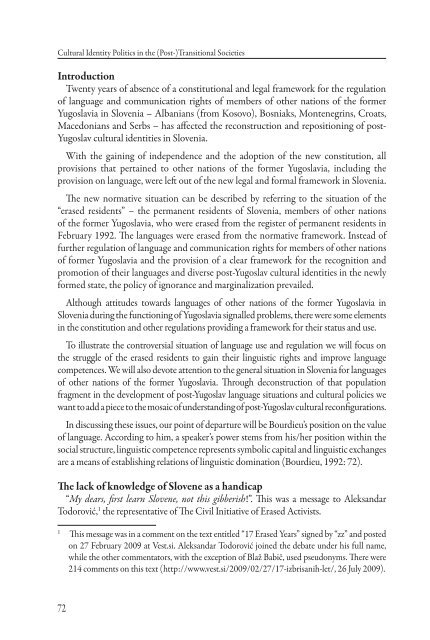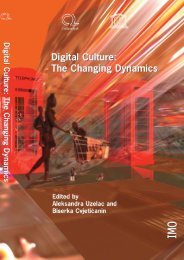free download in pdf format - Culturelink Network
free download in pdf format - Culturelink Network
free download in pdf format - Culturelink Network
You also want an ePaper? Increase the reach of your titles
YUMPU automatically turns print PDFs into web optimized ePapers that Google loves.
Cultural Identity Politics <strong>in</strong> the (Post-)Transitional Societies<br />
Introduction<br />
Twenty years of absence of a constitutional and legal framework for the regulation<br />
of language and communication rights of members of other nations of the former<br />
Yugoslavia <strong>in</strong> Slovenia – Albanians (from Kosovo), Bosniaks, Montenegr<strong>in</strong>s, Croats,<br />
Macedonians and Serbs – has aff ected the reconstruction and reposition<strong>in</strong>g of post-<br />
Yugoslav cultural identities <strong>in</strong> Slovenia.<br />
With the ga<strong>in</strong><strong>in</strong>g of <strong>in</strong>dependence and the adoption of the new constitution, all<br />
provisions that perta<strong>in</strong>ed to other nations of the former Yugoslavia, <strong>in</strong>clud<strong>in</strong>g the<br />
provision on language, were left out of the new legal and formal framework <strong>in</strong> Slovenia.<br />
Th e new normative situation can be described by referr<strong>in</strong>g to the situation of the<br />
“erased residents” – the permanent residents of Slovenia, members of other nations<br />
of the former Yugoslavia, who were erased from the register of permanent residents <strong>in</strong><br />
February 1992. Th e languages were erased from the normative framework. Instead of<br />
further regulation of language and communication rights for members of other nations<br />
of former Yugoslavia and the provision of a clear framework for the recognition and<br />
promotion of their languages and diverse post-Yugoslav cultural identities <strong>in</strong> the newly<br />
formed state, the policy of ignorance and marg<strong>in</strong>alization prevailed.<br />
Although attitudes towards languages of other nations of the former Yugoslavia <strong>in</strong><br />
Slovenia dur<strong>in</strong>g the function<strong>in</strong>g of Yugoslavia signalled problems, there were some elements<br />
<strong>in</strong> the constitution and other regulations provid<strong>in</strong>g a framework for their status and use.<br />
To illustrate the controversial situation of language use and regulation we will focus on<br />
the struggle of the erased residents to ga<strong>in</strong> their l<strong>in</strong>guistic rights and improve language<br />
competences. We will also devote attention to the general situation <strong>in</strong> Slovenia for languages<br />
of other nations of the former Yugoslavia. Th rough deconstruction of that population<br />
fragment <strong>in</strong> the development of post-Yugoslav language situations and cultural policies we<br />
want to add a piece to the mosaic of understand<strong>in</strong>g of post-Yugoslav cultural reconfi gurations.<br />
In discuss<strong>in</strong>g these issues, our po<strong>in</strong>t of departure will be Bourdieu’s position on the value<br />
of language. Accord<strong>in</strong>g to him, a speaker’s power stems from his/her position with<strong>in</strong> the<br />
social structure, l<strong>in</strong>guistic competence represents symbolic capital and l<strong>in</strong>guistic exchanges<br />
are a means of establish<strong>in</strong>g relations of l<strong>in</strong>guistic dom<strong>in</strong>ation (Bourdieu, 1992: 72).<br />
Th e lack of knowledge of Slovene as a handicap<br />
“My dears, fi rst learn Slovene, not this gibberish!”. Th is was a message to Aleksandar<br />
Todorović, 1 the representative of Th e Civil Initiative of Erased Activists.<br />
1 Th is message was <strong>in</strong> a comment on the text entitled “17 Erased Years” signed by “zz” and posted<br />
on 27 February 2009 at Vest.si. Aleksandar Todorović jo<strong>in</strong>ed the debate under his full name,<br />
while the other commentators, with the exception of Blaž Babič, used pseudonyms. Th ere were<br />
214 comments on this text (http://www.vest.si/2009/02/27/17-izbrisanih-let/, 26 July 2009).<br />
72



